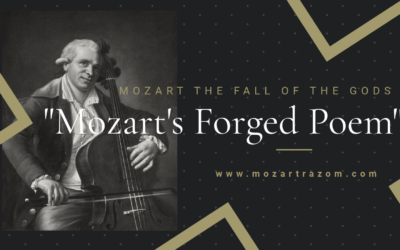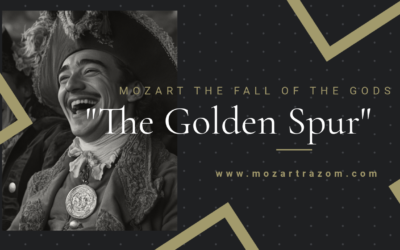The Myth of Mozart’s Education
Unveiling the Influence of Leopold Mozart
For centuries, Wolfgang Amadeus Mozart has been celebrated as a musical prodigy, effortlessly composing masterpieces from a young age. However, when we peel back the layers of myth surrounding his early education, a different picture emerges—one in which his father, Leopold Mozart, plays a far more controlling and influential role than is often acknowledged. This article explores the true nature of Mozart’s education, examining how much of his early works can be attributed to his own genius, and how much was the product of his father’s meticulous and often self-serving guidance. Was Wolfgang’s brilliance entirely his own, or was it a crafted image designed by Leopold?
Mozart: The Fall of the Gods
This book offers a fresh and critical look at the life of Wolfgang Amadeus Mozart, challenging the myths that have surrounded him for centuries. We strip away the romanticised image of the “natural genius” and delve into the contradictions within Mozart’s extensive biographies. Backed by nearly 2,000 meticulously sourced citations, this work invites readers to explore a deeper, more complex understanding of Mozart. Perfect for those who wish to question the traditional narrative, this biography is a must-read for serious music lovers and historians.
"It was not the first time that old Mozart cheated on his son’s age."
Mozart: The Fall of the Gods
The name Wolfgang Amadeus Mozart has long been synonymous with genius. Tales of his early childhood often paint a picture of a boy prodigy, sitting at the keyboard, composing minuets and symphonies with little effort. But what if the real story of Mozart’s education wasn’t quite so miraculous? What if the genius we associate with young Wolfgang was, in fact, heavily influenced, if not entirely constructed, by his father, Leopold Mozart?
Leopold was no stranger to ambition. He was a musician of modest success who, despite his best efforts, never managed to rise to the heights he had dreamed of. His career at the court of the Archbishop of Salzburg was filled with frustrations and limitations, constantly overshadowed by superior musicians. According to Niemetschek, it took young Wolfgang only “half an hour to learn a minuet or a short Lied.” Such feats were indeed impressive, but they were also the result of relentless pressure and guidance from his father.
Leopold meticulously planned his son’s education, but not with the goal of fostering a broad intellectual curiosity. Instead, his focus was singular: to turn Wolfgang into a musical sensation. It is this drive that shaped not only Wolfgang’s early compositions but also the carefully curated image of him as a child prodigy.
Leopold’s influence can be seen in many of Wolfgang’s early works. For example, much of the music in Nannerl’s notebook, long thought to be Wolfgang’s own compositions, was actually written or transcribed by Leopold. The “Minuet K.6 in C major,” once attributed to young Mozart, is in fact a piece arranged by Leopold from his own Serenade. This raises the question of how many of Wolfgang’s early works were truly his own and how many were crafted by his father’s hand.
Even more revealing is the pattern of how Leopold presented his son to the world. He carefully managed Wolfgang’s age, often falsely presenting him as younger to enhance the perception of his prodigiousness. This manipulation was a regular strategy employed by Leopold to enhance his son’s—and by extension, his own—reputation.
Leopold’s relentless control extended beyond music. His letters, which provide much of our insight into the family’s travels and experiences, show little interest in the broader world around them. He was focused on success, not education in the broader sense. While the English traveller Charles Burney wrote two detailed journals about his European tours, Leopold’s accounts are notably devoid of descriptions of the places, people, and cultures they encountered. For Leopold, everything revolved around Wolfgang’s performances and the praise they received.
Despite the grandeur often associated with Mozart’s name, the reality of his education tells a different story—one of painstaking manipulation and control. Even after Wolfgang’s death, the myth persisted, largely due to Leopold’s carefully constructed narrative. As historians have examined the records more closely, it’s become clear that many of the compositions attributed to young Wolfgang were, in fact, collaborative efforts between father and son, or even solely Leopold’s work, copied out in Wolfgang’s name.
This leads us to a critical question: if so much of young Mozart’s work was guided—or outright written—by his father, can we still consider Wolfgang the genius we’ve been taught to believe? Or should we instead reframe our understanding of his early years as the product of a family effort, where Leopold’s ambition and control played just as crucial a role as Wolfgang’s talent?
In conclusion, the myth of Mozart’s effortless genius doesn’t hold up under closer scrutiny. Leopold Mozart, a man driven by ambition, crafted a carefully controlled image of his son, manipulating not only Wolfgang’s compositions but also the public perception of his talents. While Wolfgang’s natural abilities were undeniable, his early successes were far more collaborative than history has led us to believe.
You May Also Like
#3 Leopold Mozart’s Literary Theft
Hidden within the Mozarteum’s archives lies a poem that has long been hailed as a tribute to the young Mozart children. But behind this innocent façade is a story of deception, literary theft, and one father’s ambition to rewrite history.
#4 The Golden Spur
While often portrayed as a prestigious award, the Golden Spur (Speron d’Oro) granted to Mozart in 1770 was far from a reflection of his musical genius. In this article, we delve into the true story behind this now-forgotten honour, its loss of value, and the role of Leopold Mozart’s ambitions in securing it.
Mozart Unmasked: The Untold Story of His Italian Years
Explore the lesser-known side of Wolfgang Amadé Mozart’s early years in Italy. ‘Mozart in Italy’ unveils the complexities, controversies, and hidden truths behind his formative experiences, guided by meticulous research and rare historical documents. Delve into a story that challenges the traditional narrative and offers a fresh perspective on one of history’s most enigmatic composers.
Another Example of Borrowed Genius
The myth of Mozart’s genius continues to collapse under the weight of his reliance on others’ ideas, with Leopold orchestrating his son’s supposed early brilliance.
A Genius or a Patchwork?
The genius of Mozart had yet to bloom, despite the anecdotes passed down to us. These concertos were not the work of a prodigy, but a collaborative effort between father and son, built on the music of others.
Myth, Reality, and the Hand of Martini
Mozart handed over Martini’s Antiphon, not his own, avoiding what could have been an embarrassing failure. The young prodigy had a lot to learn, and much of what followed was myth-making at its finest.







